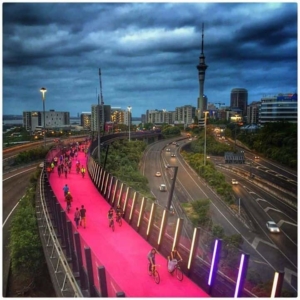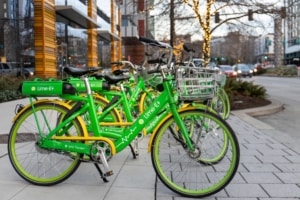Legislative Recap: CalBike and Our Allies Deliver Wins for Bikes in Sacramento
The 2022 California legislative session ended on a high note, with CalBike’s sponsored legislation and many bike-friendly bills we supported becoming law. Breaking it down:
- The legislature sent 19 excellent active transportation bills to the governor
- The governor signed 15 of these bills into law
- The governor vetoed four bills, mostly citing budget concerns
- One bill we opposed became law, but with modifications that make it less harmful
- An additional five bills died in the legislature
CalBike supporters played a key role in this victory, sending more than 5,500 emails, Tweets, and petition signatures to support active transportation legislation. Here’s a detailed recap.
CalBike-sponsored bills become law
Among the many excellent bills that passed the legislature this year are CalBike’s two sponsored bills.
The Plan for the Future Bill (SB 932, Portantino) will require general plans to include active transportation in their circulation elements and start building safe streets quickly. We co-sponsored this bill with our partners at Streets for All.
CalBike supporters sent over 2,200 emails and Twitter messages to Sacramento in support of the Plan for the Future Bill.
The Freedom to Walk Bill (AB 2147, Ting) doesn’t fully decriminalize jaywalking but prevents police from issuing tickets unless the street crossing is truly dangerous. It is a welcome first step to stop the over-enforcement of an outdated statute invented a century ago by car companies. And we know we’ve touched a nerve in the cultural zeitgeist because, for the second year in a row, this measure made it as a clue on NPR’s Wait, Wait, Don’t Tell Me!
CalBike supporters sent over 1,000 emails and Twitter messages to Sacramento in support of the Freedom to Walk.
Many more wins for active transportation
CalBike supported a historic slate of active transportation bills this year. Of 25 bills introduced, 15 (including our two sponsored bills) became law. That’s good news for people who get around by bike and for all Californians.
CalBike supporters sent over 500 emails and Twitter messages to Sacramento in support of the active transportation slate.
The OmniBike Bill (AB 1909, Friedman) makes bike-friendly changes to the California Vehicle Code. These small but significant amendments will make biking safer and increase access for e-bikes. The most significant change is that a car driver will be required to move over a full lane to pass a person riding a bike, where possible.
More than 1,800 CalBike supporters sent emails or signed a petition in support of the Omnibike Bill.
Here are the other active transportation bills that passed:
- AB 2097 Friedman – No auto parking minimums near transit
- SB 922 Wiener – CEQA exemptions for transit and active transportation infrastructure
- AB 2264 Bloom – Pedestrian head start at crossing signals
- SB 1079 Portantino – Sound-activated enforcement devices
- SB 1472 Stern – Speeding and reckless driving
- SB 307 McGuire – Great Redwood Trail Agency authorization
- SB 1230 Limon – Zero-emission and near-zero emission vehicle incentive programs
- SB 1107 Dodd – Protect California Drivers Act of 2022 increases liability insurance
- AB 2863 Wilson – Bike parking standards in building codes (research)
- AB 2174 Chen – Treat bikes and scooters as vehicles for purposes of towing regulations
AB 371 passes, but bikes spared from insurance requirement
For the past two years, we called AB 371 the Kill Bike-Share Bill because it initially imposed an outsized insurance requirement on bike and scooter sharing system operators that might have put an end to shared micromobility in California. Unfortunately, the bill passed, and the governor signed it. However, CalBike and our allies in the legislature were able to work with the bill’s author to remove the insurance requirement for shared bikes and reduce the coverage amount for scooters.
So the bad news is much less bad than it might have been, and bike-share still thrives in California. We’ll keep an eye on potential bicycle insurance requirements and be prepared to oppose it if it comes back again.
What got vetoed
The governor vetoed four excellent active transportation bills. The reason he gave for three of those vetoes was budgetary concerns because they required expenditures that weren’t in the budget passed in 2022. Those measures may come back, accompanied by budget allocations. And CalBike will work to get money set aside for an annual e-bike incentive program, even though AB 117, the bill codifying the program, got vetoed.
- SB 457 Portantino and Wilk – Car-free tax credit
- AB 1919 Holden – Free student transit passes
- AB 117 Boerner Horvath – E-bike incentives program
- AB 2438 Friedman – Align transportation funding with climate goals
What didn’t make it out of the legislature
Our biggest disappointment in 2022 was the Bicycle Safety Stop Bill. The safety stop allows people on bikes to treat stop signs as yields, and it’s been successfully implemented in several other states. It passed the legislature, but the author withdrew it ahead of a threatened veto from Governor Newsom.
Four more bills stalled out during the legislative process:
- AB 2336, Friedman – Automated speed enforcement pilot program
- AB 1778, C. Garcia – Prohibits any state funds or personnel from funding freeways in high-poverty or polluted areas
- AB 1975 Nazarian – California bus shelter funding
- AB 2237 Friedman – Regional transportation improvement plans
All five of these bills are excellent measures that would make our streets more welcoming to people on bikes, increase road safety, and make California more resilient to climate change. It sometimes takes more than one try to get a bill through, and we hope these bills come back in future sessions.
We don’t see the momentum for biking, walking, and public transit slowing down, and we’re already planning for a more ambitious agenda in 2023. Our progress this year shows that when we all raise our voices, we can bring about big changes!
Thank you to all of you who sent an email, tweeted, or signed a petition to support better biking, and congratulations on the role you played in moving California in the right direction. If you didn’t, there’s always next year.




